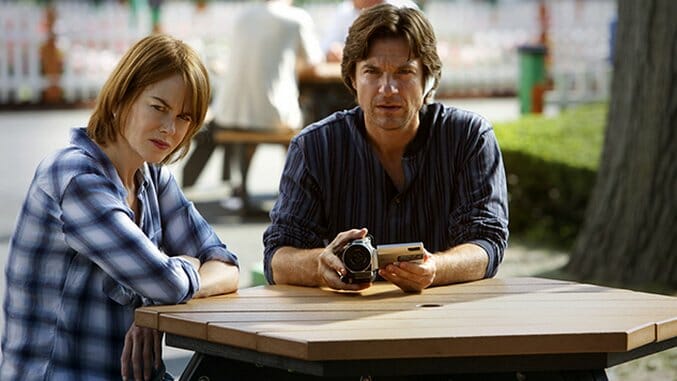With two feature films now, Jason Bateman has proven himself as a director adept in capturing the misanthropic tendencies of his outsider characters. In Bad Words (2014), Bateman played a 40-year-old a-hole on a mission to take the top prize at a national spelling bee—meant for schoolkids. In his latest project, The Family Fang, Bateman casts himself in a supporting role as Baxter Fang, a failing writer who’s more social misfit than mean-spirited, this time around leaving the majority of the bitterness and vitriol for other characters, particularly Baxter’s sister Annie (Nicole Kidman) and father Caleb (Christopher Walken).
A drama with a few comical moments, The Family Fang digs into seemingly more complex issues than Bad Words, exploring both family dynamics and the meaning of art, eventually tying its disparate themes together through a missing-person mystery (which I’ll get to below). Based on Kevin Wilson’s best-selling novel about performance artists who use their kids, Child A (Annie) and Child B (Baxter), as pawns and objets d’art in outrageous stunts, the film bounces back and forth—albeit unevenly—between the past and the present.
Annie and Baxter are struggling as adults, a point Bateman makes overly obvious: She’s an alcoholic actress on the verge of a breakdown, while Baxter is suffering from writer’s block and has blown through the last of his savings. When Baxter gets into an accident, he’s forced to recuperate at his parents’ house and asks Annie to come home as moral support. It’s an icy reunion between the children and Caleb and Camille (Maryann Plunkett), a dynamic telegraphed from the film’s rocky, poorly paced beginnings.
Intriguing flashback sequences—in which an underused Kathryn Hahn and Jason Butler Harner play the younger Camille and Caleb—reveal the source of acrimony: The maniacal Caleb leads the family in projects such as faux bank robberies and sitting for family portraits while drenched in blood at a mall photography studio. Despite the unwelcome attention and ridicule, the kids participate to please their parents, especially their father, who has an uncompromising view of life as an ongoing art project. Through the Fangs’ story, the film debates, among many ideas, the differences between avant-garde art and gimmickry, even referencing the late performance artist Chris Burden, whose “danger pieces” featured such acts as being shot by a gun and lying motionless for upwards of 45 hours. While the film casts no judgement on the worthiness of the art, it strongly posits that parents’ actions, no matter how well-intentioned, can screw up their kids for years. (Tell us something we don’t know.)
Bateman’s strength is his ability to work so well with actors—as someone in the business for a long time (he started at age 12 on Little House on the Prairie), he’s able to coax nuanced performances from his cast. Kidman, also a producer on the film, gives a solid enough performance as a typical damaged daughter (despite her Australian accent peeping through on occasion), and Walken is good as ever as an unbalanced artist and father, but it’s Plunkett’s work that, while taking up less screen time than her co-stars, is the film’s fascinating highlight. As Camille, she’s torn between her artistic and her maternal callings.
When the elder Caleb and Camille suddenly disappear, the police fear that they may be dead, but Annie and Baxter believe it’s just another performance piece. While Baxter seems at peace with letting go of his parents, Annie gets angry. She’s determined to investigate their “deaths” and drags Baxter with her. The Family Fang finally picks up its sluggish pace during the latter third of the film as the siblings unravel the truth behind the elder Fangs’ disappearance. By examining old film footage, interviews and their parents’ belongings, they sort through the wreckage of their childhoods. Regardless of their parents’ fates, Annie and Baxter are finally able to confront their pasts, but the catharsis they find feels too little too late after the film has shifted from quirky comedy to melodrama and back again. Family dysfunction is fodder for many films, but The Family Fang can’t quite decide what it wants to be, so it becomes only that: a portrait of family dysfunction that seems to just accept that dysfunction is inevitable.
Director: Jason Bateman
Writer: David Lindsay-Abaire; Kevin Wilson (novel)
Starring: Nicole Kidman, Jason Bateman, Christopher Walken, Maryann Plunkett, Kathryn Hahn, Jason Butler Harner, Marin Ireland
Release Date: May 6, 2016
Christine N. Ziemba is a Los Angeles-based freelance pop culture writer and regular contributor to Paste. You can follow her on Twitter.
